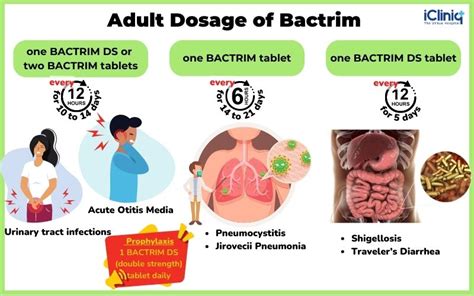Intro
Discover common Bactrim side effects, including allergic reactions, diarrhea, and nausea. Learn about rare but serious interactions, warnings, and precautions to minimize risks associated with this antibiotic medication.
The importance of understanding medication side effects cannot be overstated, especially when it comes to widely prescribed drugs like Bactrim. Bactrim, a combination of sulfamethoxazole and trimethoprim, is an antibiotic used to treat various bacterial infections. While it is effective against a range of infections, it can also cause a variety of side effects, some of which can be severe. It is crucial for patients to be aware of these potential side effects to ensure safe and effective treatment.
Understanding the side effects of Bactrim is not just about recognizing the symptoms; it's also about knowing how to manage them and when to seek medical help. This knowledge empowers patients to take an active role in their healthcare, making informed decisions about their treatment. Moreover, healthcare providers can use this information to monitor patients more effectively, adjusting treatment plans as needed to minimize adverse reactions.
The impact of Bactrim side effects can vary widely among individuals, depending on factors such as the dosage, duration of treatment, and individual health conditions. Some people may experience mild side effects that do not significantly interfere with their daily activities, while others may encounter more severe reactions that necessitate medical intervention. By delving into the specifics of Bactrim's side effects, patients and healthcare providers can work together to balance the benefits of treatment with the risks of adverse effects.
Introduction to Bactrim

Common Side Effects of Bactrim

Less Common but Serious Side Effects
Less common but potentially serious side effects of Bactrim include liver damage, indicated by elevated liver enzymes, and kidney dysfunction, which can be a concern, especially in patients with pre-existing kidney issues. Blood disorders, such as agranulocytosis, aplastic anemia, and thrombocytopenia, are rare but can be life-threatening. Patients should be aware of the signs of these conditions, such as unusual bleeding, bruising, or signs of infection, and report them to their healthcare provider immediately.Managing Bactrim Side Effects

Prevention Strategies
Prevention strategies include careful patient selection, ensuring that Bactrim is prescribed only when necessary and that patients are aware of the potential risks. Dose adjustments may be necessary for patients with kidney or liver impairment. Additionally, patients should be counseled on the signs of serious side effects and the importance of adherence to the prescribed treatment regimen.Bactrim Interactions and Contraindications

Special Considerations
Special considerations are necessary for certain patient populations, including the elderly, who may be more susceptible to the side effects of Bactrim due to decreased renal function and other age-related health issues. Pediatric patients also require careful dosing to minimize the risk of side effects.Conclusion and Future Directions

Final Thoughts
As with any medication, the decision to prescribe Bactrim should be made thoughtfully, weighing the potential benefits against the risks of side effects. By doing so, we can ensure that patients receive the most appropriate and safe treatment for their bacterial infections.What are the most common side effects of Bactrim?
+The most common side effects of Bactrim include nausea, vomiting, diarrhea, and an unpleasant taste. Allergic reactions can also occur, ranging from mild to severe.
Can Bactrim cause serious side effects?
+Yes, Bactrim can cause serious side effects, including liver damage, kidney dysfunction, and blood disorders. These conditions are rare but can be life-threatening and require immediate medical attention.
How can Bactrim side effects be managed?
+Bactrim side effects can be managed through hydration, dietary changes, and in some cases, additional medications. Monitoring for signs of serious side effects and reporting them to a healthcare provider is crucial.
We invite you to share your experiences or ask questions about Bactrim side effects in the comments below. Your input can help others understand the potential risks and benefits of this medication. If you found this article informative, please consider sharing it with others who might benefit from this information. Together, we can promote safer and more effective use of antibiotics like Bactrim.
